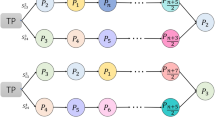Abstract
Recently, Wang et al. (Int J Theo Phys: pp. 3716–3726, 2018) proposed a multiparty quantum key agreement scheme with four-particles W state. Their protocol uses the delayed measurement technique, the block transmission technique, and the single decoy photon technique to determine a shared secret key between three or more participants. They claimed that their protocol could resist both internal/participant and external attacks. However, this work indicates that two dishonest participants can collude to get the private data of a participant who executes the protocol honestly. To solve this issue, a simple modification is suggested in this work.
Similar content being viewed by others
References
Bennett, C.H., Brassard, G.: Quantum cryptography: public key distribution and coin tossing. Theor. Comput. Sci. 560(12), 7–11 (2014)
Deng, F.-G., Long, G.L.: Secure direct communication with a quantum one-time pad. Phys. Rev. A. 69(5), 052319 (2004)
Farouk, A., Zakaria, M., Megahed, A., Omara, F.A.: A generalized architecture of quantum secure direct communication for N disjointed users with authentication. Sci. Rep. 5, 16080 (2015)
Liu, Z., Chen, H.: Cryptanalysis of the efficient controlled quantum secure directcommunication and authentication by using four particle cluster states protocol. Int. J. Theor. Phys. 58 (6), 1989–1998 (2019)
Hillery, M., Bužek, V., Berthiaume, A.: Quantum secret sharing. Phys. Rev. A. 59(3), 1829 (1999)
Abulkasim, H., Hamad, S., El Bahnasy, K., Rida, S.Z.: Authenticated quantum secret sharing with quantum dialogue based on bell states. Phys. Scr. 91(8), 085101 (2016)
Gao, G., Wang, Y., Wang, D., Ye, L.: Comment on ‘authenticated quantum secret sharing with quantum dialogue based on bell states’. Phys. Scr. 93(2), 027002 (2018)
Abulkasim, H., Hamad, S., Elhadad, A.: Reply to comment on ‘authenticated quantum secret sharing with quantum dialogue based on bell states. Phys. Scr. 93(2), 027001 (2018)
Abulkasim, H., Hamad, S., Khalifa, A., El Bahnasy, K.: Quantum secret sharing with identity authentication based on bell states. Int. J. Quantum Inf. 15(04), 1750023 (2017)
Gu, J., Hwang, T., Tsai, C.-W.: Improvement on ‘cryptanalysis and improvement of a multiparty quantum direct secret sharing of classical messages with bell states and bell measurements’. Int. J. Theor. Phys. 58 (7), 2341–2345 (2019)
Abulkasim, H., Farouk, A., Alsuqaih, H., Hamdan, W., Hamad, S., Ghose, S.: Improving the security of quantum key agreement protocols with single photon in both polarization and spatial-mode degrees of freedom. Quantum Inf. Process. 17(11), 316 (2018)
Liu, H.-N., Liang, X.-Q., Jiang, D.-H., Zhang, Y.-H., Xu, G.-B.: Multi-party quantum key agreement protocol with bell states and single particles. Int. J. Theor. Phys. 58 (5), 1659–1666 (2019)
Abulkasim, H., Alsuqaih, H.N., Hamdan, W.F., Hamad, S., Farouk, A., Mashatan, A., Ghose, S.: Improved dynamic multi-party quantum private comparison for next-generation mobile network. IEEE Access. 7, 17917–17926 (2019)
Deng, Z., Zhang, Y., Zhang, X., Li, L.: Privacy-preserving quantum multi-party computation based on circular structure. J. Inf. Secur. Appl. 47, 120–124 (2019)
Gu, J., Ho, C.-Y., Hwang, T.: Statistics attack on ‘quantum private comparison with a malicious third party’and its improvement. Quantum Inf. Process. 17(2), 23 (2018)
Gu, J., Hwang, T., Tsai, C.-W.: Improving the security of ‘high-capacity quantum summation with single photons in both polarization and spatial-mode degrees of freedom’. Int. J. Theor. Phys. 58 (7), 2213–2217 (2019)
Zhang, M.-H., Cao, Z.-W., Peng, J.-Y.: Fault-tolerant asymmetric quantum dialogue protocols against collective noise. Quantum Inf. Process. 17(8), 204 (2018)
Niu, X.-F., Zhang, J.-Z., Xie, S.-C., Chen, B.-Q.: An improved quantum voting scheme. Int. J. Theor. Phys. 57(10), 3200–3206 (2018)
Naseri, M., Abdolmaleky, M., Laref, A., Parandin, F., Celik, T., Farouk, A., Mohamadi, M., Jalalian, H.: A new cryptography algorithm for quantum images. Optik. 171, 947–959 (2018)
Bouwmeester, D., Pan, J.-W., Mattle, K., Eibl, M., Weinfurter, H., Zeilinger, A.: Experimental quantum teleportation. Nature. 390(6660), 575 (1997)
Shao, Z., Long, Y.: Circular controlled quantum teleportation by a genuine sevenqubit entangled state. Int. J. Theor. Phys. 58 (6) 1957–1967 (2019)
Zhou, N., Zeng, G., Xiong, J.: Quantum key agreement protocol. Electron. Lett. 40(18), 1149–1150 (2004)
Lin, P.-H., Hwang, T., Tsai, C.-W.: Efficient semi-quantum private comparison using single photons. Quantum Inf. Process. 18(7), 207 (2019)
Min, S.-Q., Chen, H.-Y., Gong, L.-H.: Novel multi-party quantum key agreement protocol with g-like states and bell states. Int. J. Theor. Phys. 57(6), 1811–1822 (2018)
Zhao, X.-Q., Zhou, N.-R., Chen, H.-Y., Gong, L.-H.: Multiparty quantum key agreement protocol with entanglement swapping. Int. J. Theor. Phys. 58(2), 436–450 (2019)
Wang, S.-S., Jiang, D.-H., Xu, G.-B., Zhang, Y.-H., Liang, X.-Q.: Quantum key agreement with bell states and cluster states under collective noise channels. Quantum Inf. Process. 18(6), 190 (2019)
Chou, Y.-H., Zeng, G.-J., Chang, Z.-H., Kuo, S.-Y.: Dynamic group multi-party quantum key agreement. Sci. Rep. 8(1), 4633 (2018)
Wang, S.-S., Xu, G.-B., Liang, X.-Q., Wu, Y.-L.: Multiparty quantum key agreement with four-qubit symmetric W state. Int. J. Theor. Phys. 57(12), 3716–3726 (2018)
Author information
Authors and Affiliations
Corresponding author
Additional information
Publisher’s Note
Springer Nature remains neutral with regard to jurisdictional claims in published maps and institutional affiliations.
Rights and permissions
About this article
Cite this article
Abulkasim, H., Alotaibi, A. Improvement on ‘Multiparty Quantum Key Agreement with Four-Qubit Symmetric W State’. Int J Theor Phys 58, 4235–4240 (2019). https://doi.org/10.1007/s10773-019-04293-3
Received:
Accepted:
Published:
Issue Date:
DOI: https://doi.org/10.1007/s10773-019-04293-3




